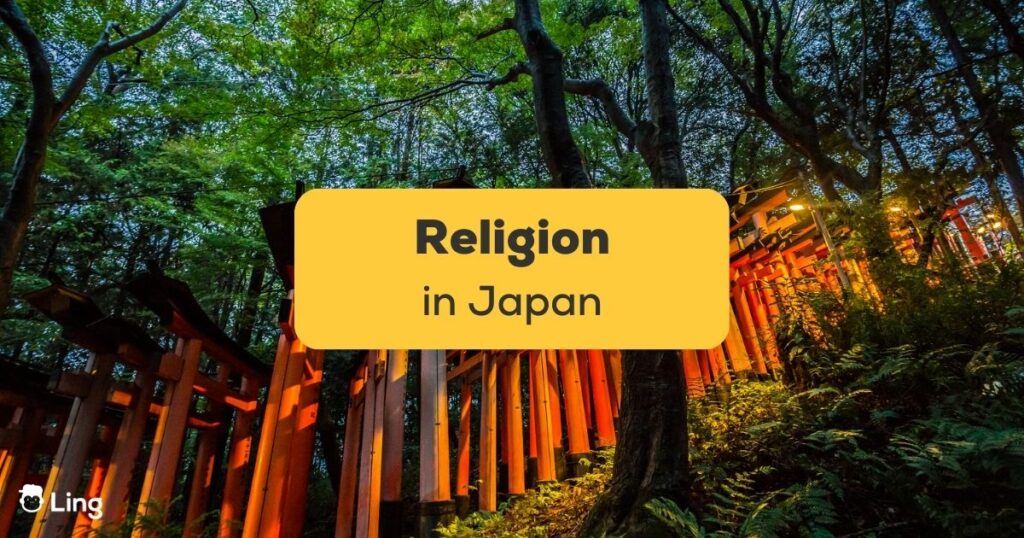Wondering about the religion in Japan? In this article, we’ll dive deep into the rich tapestry of Japanese religious life, exploring the origins, history, and practices of four major religions that have shaped the country’s spiritual landscape. Here, we’re going to find out why Japan’s religious diversity is fascinating, from ancient spiritual beliefs to more recent arrivals. As a bonus, we’ll also introduce some new vocabulary related to religion, giving you a deeper understanding of Japanese culture and language!
Exploring The Largest Religion In Japan
What Is The Main Japanese Religion?
In Japan, there isn’t one dominant religion. Instead, you’ll find a mix of different religious beliefs and practices coexisting together. Modern Japan is home to 4 key religions, namely:
- Shintoism
- Buddhism
- Confucianism
- Christianity
Shinto and Buddhism are considered major religions, while Confucianism and Christianity are considered minor religions. However, the Japanese population considers the first two as the national religions, owing to the many Shinto shrines and Buddhist temples scattered around the country.
Shintoism, for one, is a religious belief that has deep ties to Japanese history and government. On the other hand, Buddhism came to Japan via the Korean peninsula back in the Yamato period (sixth century AD), becoming a significant part of Japanese religion. Confucianism has been around for a long time; it influenced religion in Japan as early as 285 AD, or the Kofun period. Finally, Christianity is a relatively young but popular minority religion in Japan, taking root in 1549, introduced by Jesuit missionaries who came to the country.
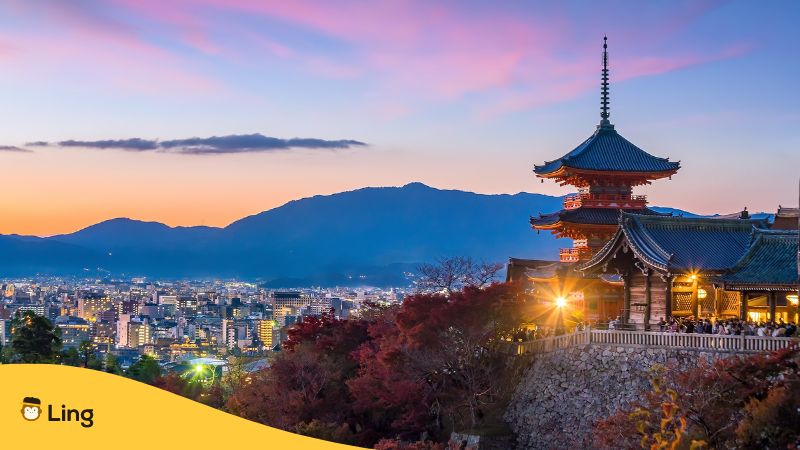
How Important Is Religion In Japan?
In contrast to Western-style definitions of religious beliefs, Japanese religions do not focus on preaching or following strict doctrines. Instead, Japan’s population uses religion as a moral compass, as a guide to living a good life. Many Japanese customs are deeply rooted in spirituality and religion, making it difficult to separate religion and culture.
From the numerous matsuri (祭, festivals) rooted in religious beliefs to the art and architecture, you will find traces of Japanese religions in many facets of Japanese culture. This practice shows that most Japanese foster a sense of unity and cultural identity through the religions they practice.
Buddhism, too, has left an indelible mark on Japanese culture, influencing everything from meditation practices to the aesthetic principles of gardens and tea ceremonies. This blending of Shintoism and Buddhism has led to the unique concept of Shinbutsu-shūgō (神仏習合, syncretism of gods and buddhas).
Do Japanese People Talk About Religion?
In Japan, religion is often considered a private and family-oriented matter. Families usually have a small household shrine called kamidana (神棚, god/spirit-shelf) for Shinto rituals and a butsudan (仏壇, Buddhist altar) for Buddhist rituals, where they pay respect to their ancestors and deities. This intimate connection between religion and family reflects the deep-rooted importance of spirituality in Japanese society.
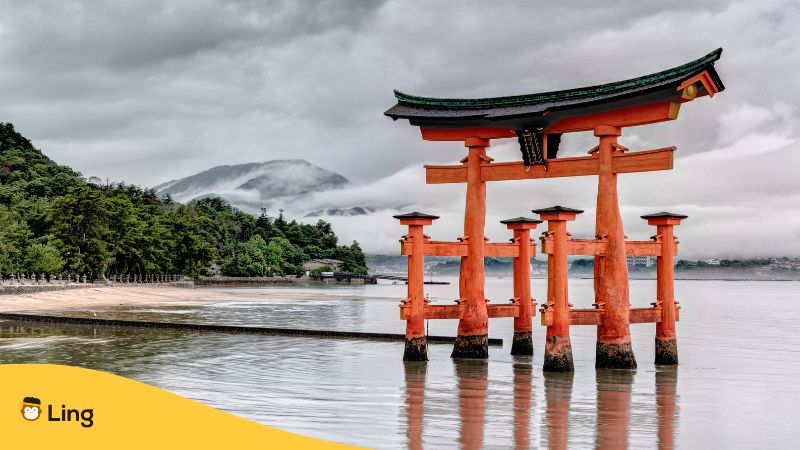
Religions Of The Japanese People
Shinto
Shinto, Japan’s national religion, has been around since the 6th century C.E., but its roots can be traced way back to the 6th century B.C.E. What’s unique about Shinto is that there’s no founder, sacred texts, or set doctrines. Instead, it’s all about the belief in kami—sacred or divine beings.
The religion’s story began in ancient Japan, as people started worshiping nature throughout the beautiful Japanese archipelago. However, things changed during the Meiji Era, when Japan’s nationalist leaders decided to kick out Buddhist influences from kami worship. That’s when State Shinto was born, and some historians even consider this the birth of Shinto as a distinct religion.
Throughout Japanese history, Shinto has played a huge role in shaping the country’s life, culture, and even politics. But it wasn’t alone—Buddhism and Confucianism were also major spiritual and cultural influences. Shinto has always been part of a fascinating mix that makes Japan what it is today.
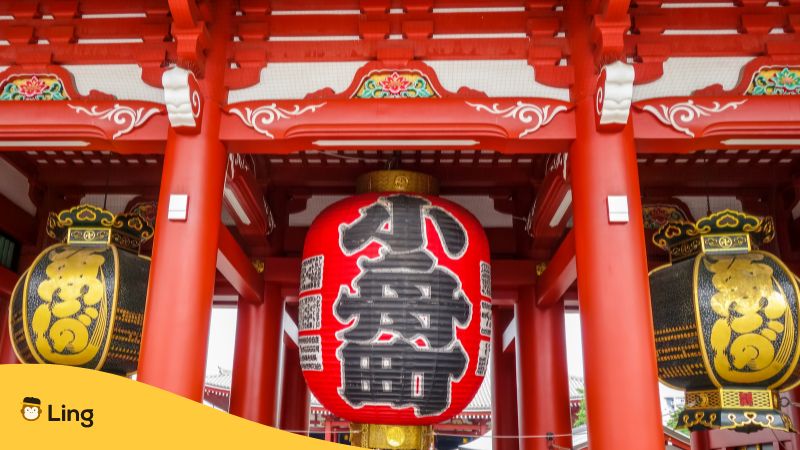
Buddhism
Buddhism made its way to Japan in the 6th century CE. During the Nara period (710-794 CE), six primary Chinese Buddhist schools were introduced to the country, but only two have survived until today. These schools thrived mainly in that period, so now they’re often grouped under the Buddhist sect, “Nara Buddhism.”
As time passed, the Heian period (794-1185) saw the birth of two more Buddhist schools in Japan: Tendai and Shingon. The trend continued in the Kamakura period (1192-1338), with the emergence of other schools like Pure Land, Nichiren, and Zen Buddhism. Today, it is one of the biggest Japanese religions practiced by many devout Japanese people.
Five Major Schools Of Japanese Buddhist Temples
Tendai (天台宗, Tendai-shū) – A Mahayana Buddhist school that originated in China, Tendai was introduced to Japan in the 9th century. It’s known for emphasizing the Lotus Sutra (法華経, Hokekyō) and its teachings on the concept of emptiness (空, Kū).
Shingon (真言宗, Shingon-shū) – This form of esoteric Buddhism was brought to Japan in the 9th century by Kūkai (空海). Shingon places importance on mantras (真言, Shingon), mudras (印相, Inzō), and mandalas (曼荼羅, Mandara) in meditation.
Pure Land (浄土宗, Jōdo-shū) – A Mahayana Buddhist school, Pure Land emphasizes devotion to Amitabha Buddha (阿弥陀仏, Amida Butsu) and his Western Paradise (浄土, Jōdo) as a means of attaining enlightenment.
Nichiren (日蓮宗, Nichiren-shū) – Founded by Nichiren (日蓮) in the 13th century, this school of Buddhism focuses on devotion to the Lotus Sutra (法華経, Hokekyō) and the chanting of Nam-myoho-renge-kyo (南無妙法蓮華経) to achieve enlightenment.
Zen (禅, Zen) – A school of Mahayana Buddhism that originated in China and was introduced to Japan in the 12th century, Zen emphasizes meditation (座禅, Zazen) to attain enlightenment.
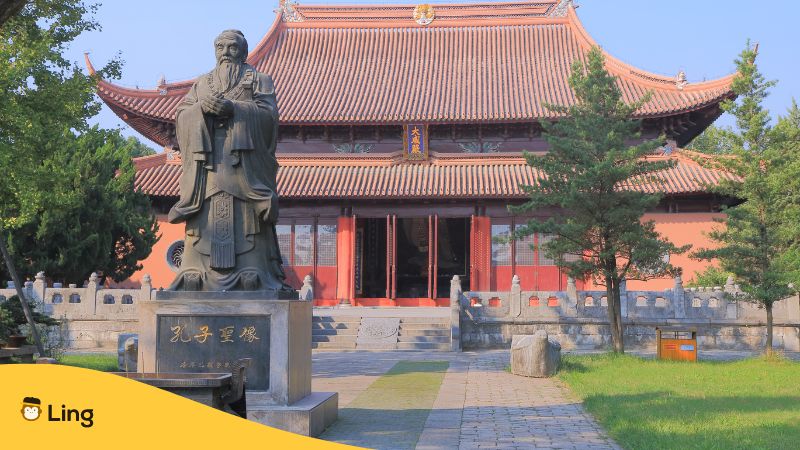
Confucianism
Confucianism, a philosophy from China, made its way to Japan in the 5th century. It highlights the significance of social order, education, and moral values. During the Edo period (1603-1868), Confucianism really left its mark on Japanese society, as it was embraced as the official ideology of the Tokugawa shogunate. Nowadays, Confucianism isn’t seen as a religion in Japan but more as a collection of ethical and moral principles that still shape the country’s society and culture.
Modern Japanese people engage with Confucianism in a variety of ways. Some dive into Confucian texts or attend talks on Confucian philosophy, while others bring Confucian values into their everyday lives—like respecting elders and promoting social harmony. As far as other religions go, the most devout Japanese Confucians spend much time reflecting on its tenets!

Christianity
Christianity first arrived in Japan thanks to the Portuguese Jesuit missionary Francis Xavier in 1549. At first, the Japanese people welcomed it with open arms. However, during the Edo period (1603-1868), Christianity faced suppression, as it was banned, and its followers were persecuted, leading many Christians to flee to other countries.
Fast-forward to the Meiji Restoration in 1868, Christianity was allowed back into Japan. Nowadays, it’s a minority religion, with less than 1% of the population identifying as Christians. However, in contemporary Japan, people engage with Christianity in various ways. Some attend church regularly and participate in religious ceremonies, while others bring Christian beliefs and practices into their everyday lives – like reading the Bible or praying at home.
Vocabulary About Japanese Religions And Everyday Life
General Vocabulary
| English | Japanese | Romaji |
| faith, belief | 信仰 | shinkou |
| religion | 宗教 | shuukyou |
| Shinto shrine | 神社 | jinja |
| Buddhist temple | 寺 | tera |
Japanese Words About Shintoism
| English | Japanese | Romaji |
| Shintoism | 神道 | Shintou |
| deity or god in Shintoism | 神 | kami |
| respectful term for a deity or god in Shintoism | 神様 | kami-sama |
Japanese Words About Buddhism
| English | Japanese | Romaji |
| Buddhism | 仏教 | Bukkyou |
| Buddha | 仏 | hotoke |
| Buddhist scripture | お経 | okane |
| Buddhist temples | 寺 | tera |
Japanese Words About Confucianism
| English | Japanese | Romaji |
| Confucianism | 儒教 | Jukyou |
| Confucius | 孔子 | Koushi |
Japanese Words About Christianity
| English | Japanese | Romaji |
| Christianity | キリスト教 | Kirisutokyou |
| Church | 教会 | kyoukai |
| Jesus Christ | イエス・キリスト | Iesu Kirisuto |
Learn Japanese With Ling
Japanese religion is a great thing to read about, especially over a nice, piping hot cup of ryokucha (緑茶, green tea). However, you can only learn so much by reading about Japanese culture in English! Thankfully, we have the perfect way to help you out: Ling! This language-learning platform is equipped with hundreds of lessons in Japanese and over 60 more languages. Each lesson is crafted to make learning fun, exciting, and memorable.
Get started on your Japanese language lessons today by downloading the Ling app for free on Android or iPhone.
